Social Psychology in Organizations: Theories and Applications
VerifiedAdded on 2022/12/14
|10
|2513
|150
Report
AI Summary
This report delves into the application of social psychology within organizational settings, examining critical elements such as social identity, power dynamics, and conflict resolution. It explores the significance of social cognition and thinking, and analyzes how power influences both social and organizational life, including the importance of ethical behavior. The report also discusses social influence, norms, and conflict, differentiating between constructive, destructive, and asymmetric conflicts. Furthermore, it addresses cognitive and behavioral reactions to threats to identity, trust repair, and the role of organizational behavior and social psychology. The analysis extends to aggression management, intergroup dynamics, discrimination, and prejudice reduction, including relevant theories to improve intergroup relations. The report emphasizes the impact of social psychology on organizational effectiveness and the need to understand employees' social needs and behaviors to run organizations effectively.
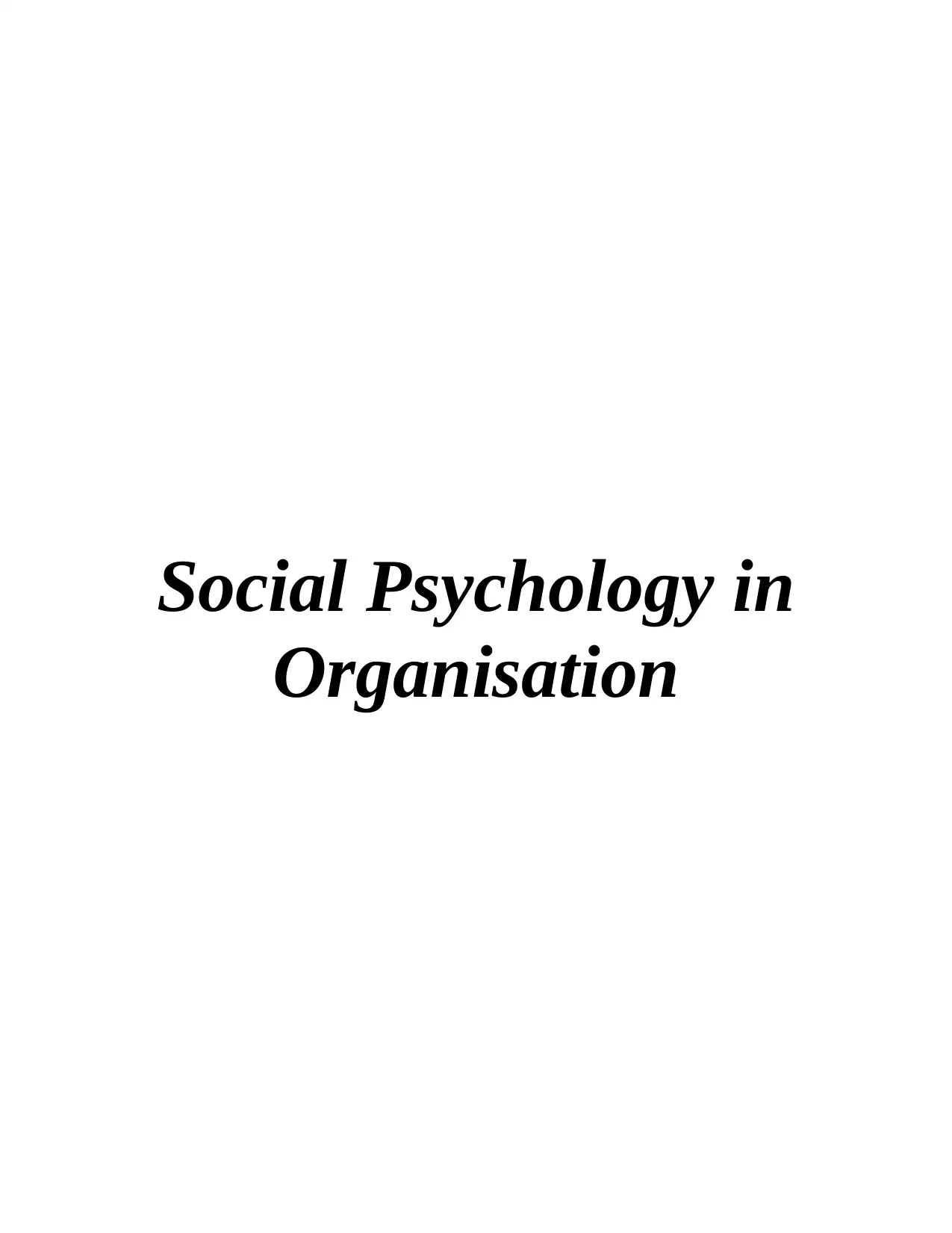
Social Psychology in
Organisation
Organisation
Paraphrase This Document
Need a fresh take? Get an instant paraphrase of this document with our AI Paraphraser
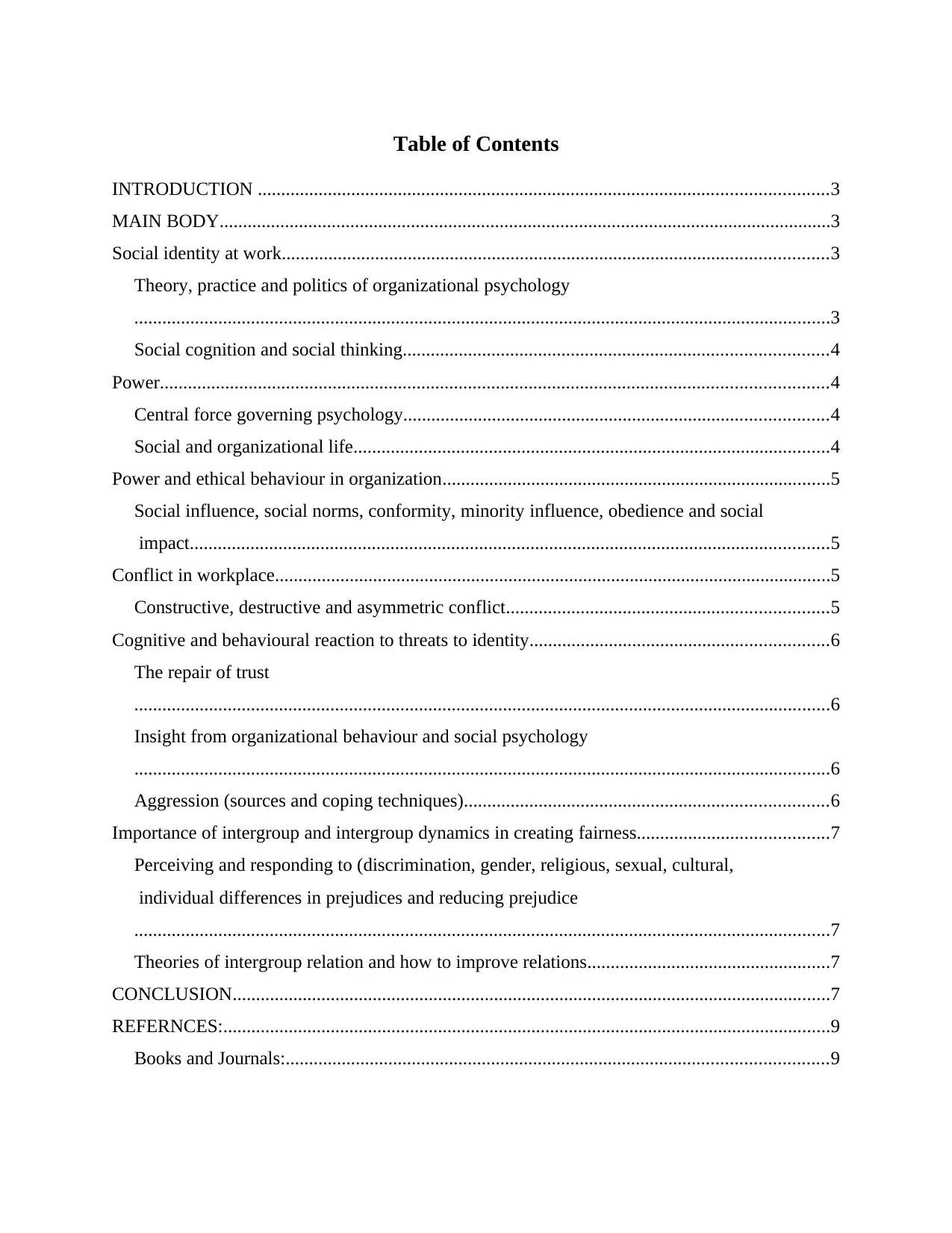
Table of Contents
INTRODUCTION ..........................................................................................................................3
MAIN BODY...................................................................................................................................3
Social identity at work.....................................................................................................................3
Theory, practice and politics of organizational psychology
.....................................................................................................................................................3
Social cognition and social thinking...........................................................................................4
Power...............................................................................................................................................4
Central force governing psychology...........................................................................................4
Social and organizational life......................................................................................................4
Power and ethical behaviour in organization...................................................................................5
Social influence, social norms, conformity, minority influence, obedience and social
impact.........................................................................................................................................5
Conflict in workplace.......................................................................................................................5
Constructive, destructive and asymmetric conflict.....................................................................5
Cognitive and behavioural reaction to threats to identity................................................................6
The repair of trust
.....................................................................................................................................................6
Insight from organizational behaviour and social psychology
.....................................................................................................................................................6
Aggression (sources and coping techniques)..............................................................................6
Importance of intergroup and intergroup dynamics in creating fairness.........................................7
Perceiving and responding to (discrimination, gender, religious, sexual, cultural,
individual differences in prejudices and reducing prejudice
.....................................................................................................................................................7
Theories of intergroup relation and how to improve relations....................................................7
CONCLUSION................................................................................................................................7
REFERNCES:..................................................................................................................................9
Books and Journals:....................................................................................................................9
INTRODUCTION ..........................................................................................................................3
MAIN BODY...................................................................................................................................3
Social identity at work.....................................................................................................................3
Theory, practice and politics of organizational psychology
.....................................................................................................................................................3
Social cognition and social thinking...........................................................................................4
Power...............................................................................................................................................4
Central force governing psychology...........................................................................................4
Social and organizational life......................................................................................................4
Power and ethical behaviour in organization...................................................................................5
Social influence, social norms, conformity, minority influence, obedience and social
impact.........................................................................................................................................5
Conflict in workplace.......................................................................................................................5
Constructive, destructive and asymmetric conflict.....................................................................5
Cognitive and behavioural reaction to threats to identity................................................................6
The repair of trust
.....................................................................................................................................................6
Insight from organizational behaviour and social psychology
.....................................................................................................................................................6
Aggression (sources and coping techniques)..............................................................................6
Importance of intergroup and intergroup dynamics in creating fairness.........................................7
Perceiving and responding to (discrimination, gender, religious, sexual, cultural,
individual differences in prejudices and reducing prejudice
.....................................................................................................................................................7
Theories of intergroup relation and how to improve relations....................................................7
CONCLUSION................................................................................................................................7
REFERNCES:..................................................................................................................................9
Books and Journals:....................................................................................................................9

⊘ This is a preview!⊘
Do you want full access?
Subscribe today to unlock all pages.

Trusted by 1+ million students worldwide
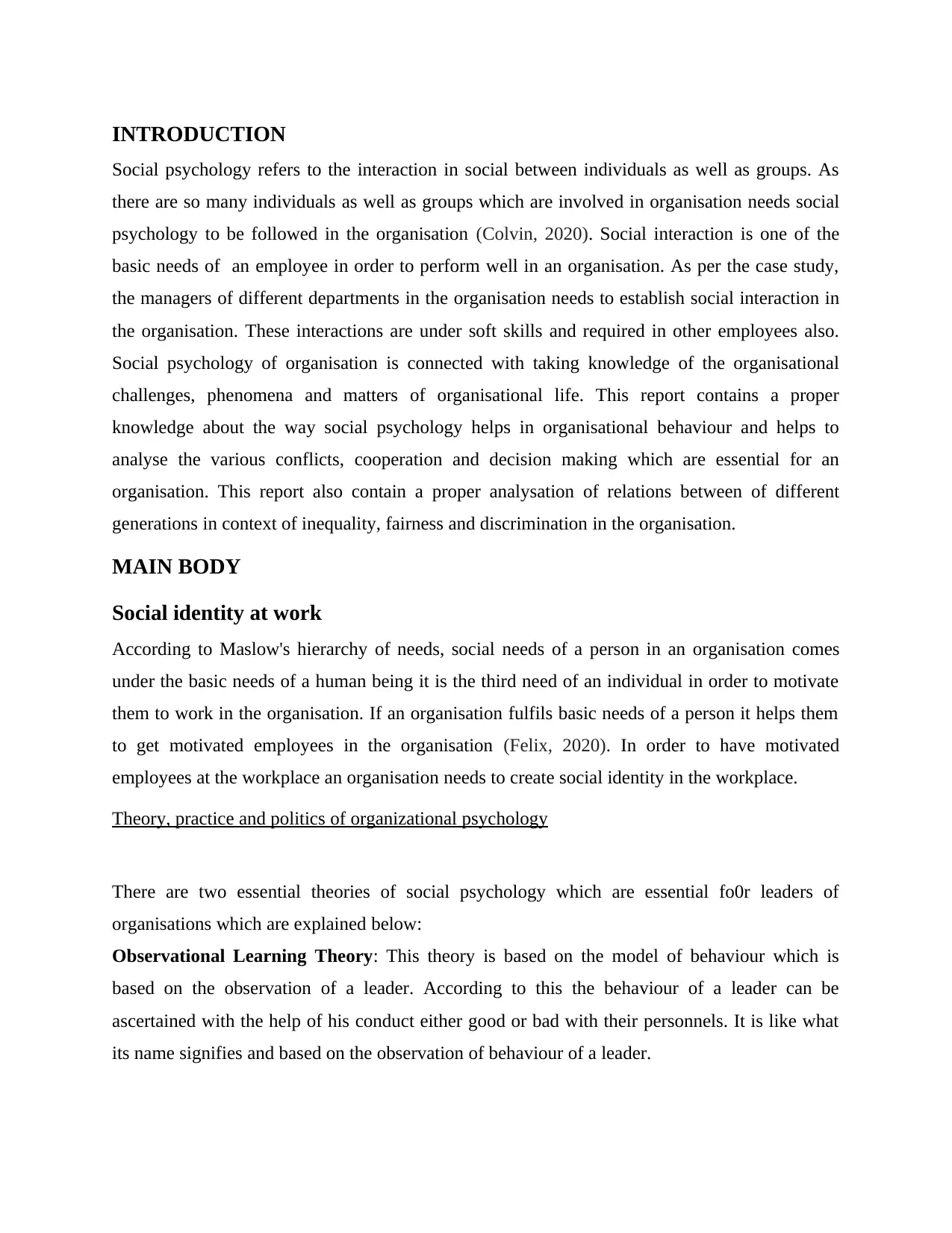
INTRODUCTION
Social psychology refers to the interaction in social between individuals as well as groups. As
there are so many individuals as well as groups which are involved in organisation needs social
psychology to be followed in the organisation (Colvin, 2020). Social interaction is one of the
basic needs of an employee in order to perform well in an organisation. As per the case study,
the managers of different departments in the organisation needs to establish social interaction in
the organisation. These interactions are under soft skills and required in other employees also.
Social psychology of organisation is connected with taking knowledge of the organisational
challenges, phenomena and matters of organisational life. This report contains a proper
knowledge about the way social psychology helps in organisational behaviour and helps to
analyse the various conflicts, cooperation and decision making which are essential for an
organisation. This report also contain a proper analysation of relations between of different
generations in context of inequality, fairness and discrimination in the organisation.
MAIN BODY
Social identity at work
According to Maslow's hierarchy of needs, social needs of a person in an organisation comes
under the basic needs of a human being it is the third need of an individual in order to motivate
them to work in the organisation. If an organisation fulfils basic needs of a person it helps them
to get motivated employees in the organisation (Felix, 2020). In order to have motivated
employees at the workplace an organisation needs to create social identity in the workplace.
Theory, practice and politics of organizational psychology
There are two essential theories of social psychology which are essential fo0r leaders of
organisations which are explained below:
Observational Learning Theory: This theory is based on the model of behaviour which is
based on the observation of a leader. According to this the behaviour of a leader can be
ascertained with the help of his conduct either good or bad with their personnels. It is like what
its name signifies and based on the observation of behaviour of a leader.
Social psychology refers to the interaction in social between individuals as well as groups. As
there are so many individuals as well as groups which are involved in organisation needs social
psychology to be followed in the organisation (Colvin, 2020). Social interaction is one of the
basic needs of an employee in order to perform well in an organisation. As per the case study,
the managers of different departments in the organisation needs to establish social interaction in
the organisation. These interactions are under soft skills and required in other employees also.
Social psychology of organisation is connected with taking knowledge of the organisational
challenges, phenomena and matters of organisational life. This report contains a proper
knowledge about the way social psychology helps in organisational behaviour and helps to
analyse the various conflicts, cooperation and decision making which are essential for an
organisation. This report also contain a proper analysation of relations between of different
generations in context of inequality, fairness and discrimination in the organisation.
MAIN BODY
Social identity at work
According to Maslow's hierarchy of needs, social needs of a person in an organisation comes
under the basic needs of a human being it is the third need of an individual in order to motivate
them to work in the organisation. If an organisation fulfils basic needs of a person it helps them
to get motivated employees in the organisation (Felix, 2020). In order to have motivated
employees at the workplace an organisation needs to create social identity in the workplace.
Theory, practice and politics of organizational psychology
There are two essential theories of social psychology which are essential fo0r leaders of
organisations which are explained below:
Observational Learning Theory: This theory is based on the model of behaviour which is
based on the observation of a leader. According to this the behaviour of a leader can be
ascertained with the help of his conduct either good or bad with their personnels. It is like what
its name signifies and based on the observation of behaviour of a leader.
Paraphrase This Document
Need a fresh take? Get an instant paraphrase of this document with our AI Paraphraser
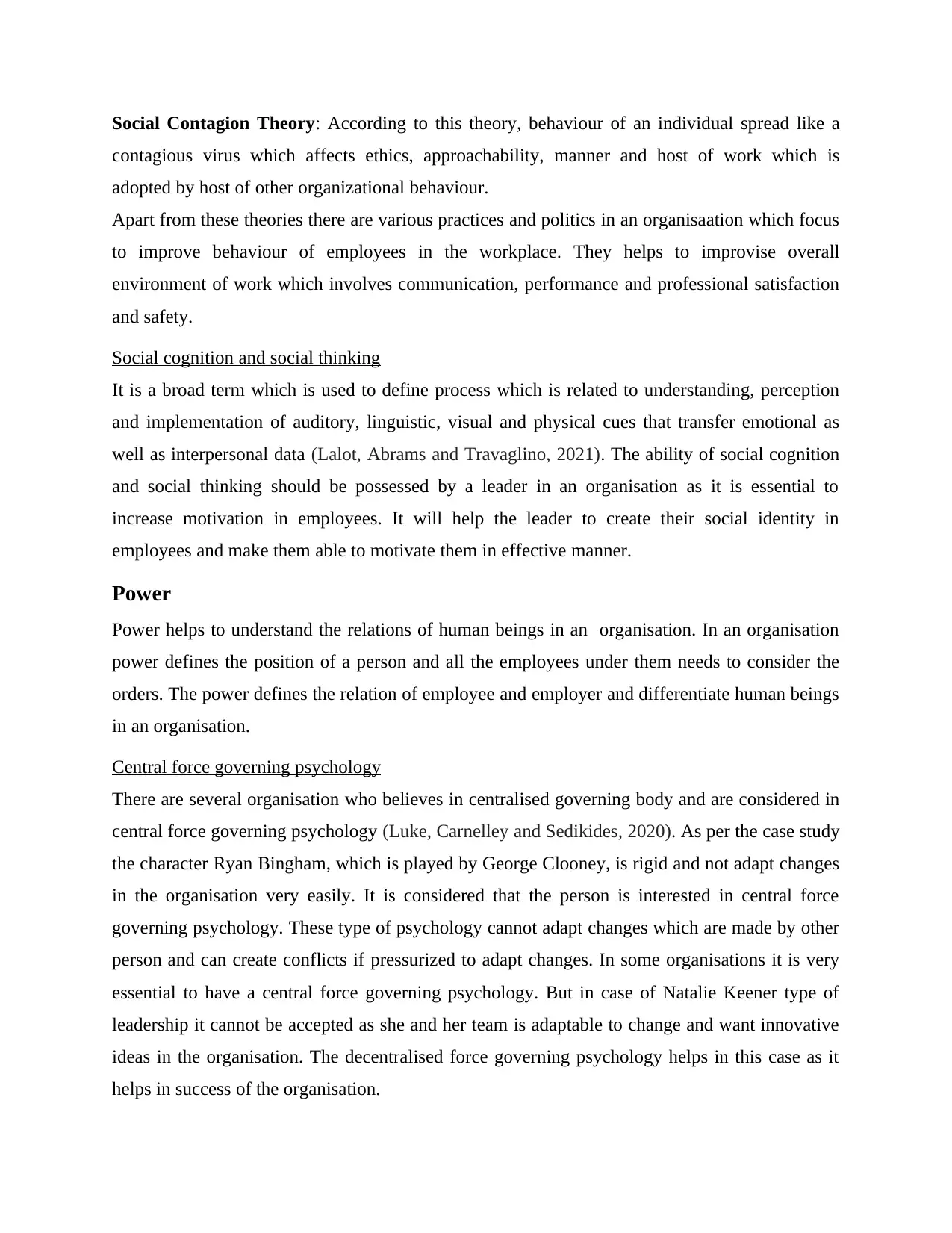
Social Contagion Theory: According to this theory, behaviour of an individual spread like a
contagious virus which affects ethics, approachability, manner and host of work which is
adopted by host of other organizational behaviour.
Apart from these theories there are various practices and politics in an organisaation which focus
to improve behaviour of employees in the workplace. They helps to improvise overall
environment of work which involves communication, performance and professional satisfaction
and safety.
Social cognition and social thinking
It is a broad term which is used to define process which is related to understanding, perception
and implementation of auditory, linguistic, visual and physical cues that transfer emotional as
well as interpersonal data (Lalot, Abrams and Travaglino, 2021). The ability of social cognition
and social thinking should be possessed by a leader in an organisation as it is essential to
increase motivation in employees. It will help the leader to create their social identity in
employees and make them able to motivate them in effective manner.
Power
Power helps to understand the relations of human beings in an organisation. In an organisation
power defines the position of a person and all the employees under them needs to consider the
orders. The power defines the relation of employee and employer and differentiate human beings
in an organisation.
Central force governing psychology
There are several organisation who believes in centralised governing body and are considered in
central force governing psychology (Luke, Carnelley and Sedikides, 2020). As per the case study
the character Ryan Bingham, which is played by George Clooney, is rigid and not adapt changes
in the organisation very easily. It is considered that the person is interested in central force
governing psychology. These type of psychology cannot adapt changes which are made by other
person and can create conflicts if pressurized to adapt changes. In some organisations it is very
essential to have a central force governing psychology. But in case of Natalie Keener type of
leadership it cannot be accepted as she and her team is adaptable to change and want innovative
ideas in the organisation. The decentralised force governing psychology helps in this case as it
helps in success of the organisation.
contagious virus which affects ethics, approachability, manner and host of work which is
adopted by host of other organizational behaviour.
Apart from these theories there are various practices and politics in an organisaation which focus
to improve behaviour of employees in the workplace. They helps to improvise overall
environment of work which involves communication, performance and professional satisfaction
and safety.
Social cognition and social thinking
It is a broad term which is used to define process which is related to understanding, perception
and implementation of auditory, linguistic, visual and physical cues that transfer emotional as
well as interpersonal data (Lalot, Abrams and Travaglino, 2021). The ability of social cognition
and social thinking should be possessed by a leader in an organisation as it is essential to
increase motivation in employees. It will help the leader to create their social identity in
employees and make them able to motivate them in effective manner.
Power
Power helps to understand the relations of human beings in an organisation. In an organisation
power defines the position of a person and all the employees under them needs to consider the
orders. The power defines the relation of employee and employer and differentiate human beings
in an organisation.
Central force governing psychology
There are several organisation who believes in centralised governing body and are considered in
central force governing psychology (Luke, Carnelley and Sedikides, 2020). As per the case study
the character Ryan Bingham, which is played by George Clooney, is rigid and not adapt changes
in the organisation very easily. It is considered that the person is interested in central force
governing psychology. These type of psychology cannot adapt changes which are made by other
person and can create conflicts if pressurized to adapt changes. In some organisations it is very
essential to have a central force governing psychology. But in case of Natalie Keener type of
leadership it cannot be accepted as she and her team is adaptable to change and want innovative
ideas in the organisation. The decentralised force governing psychology helps in this case as it
helps in success of the organisation.
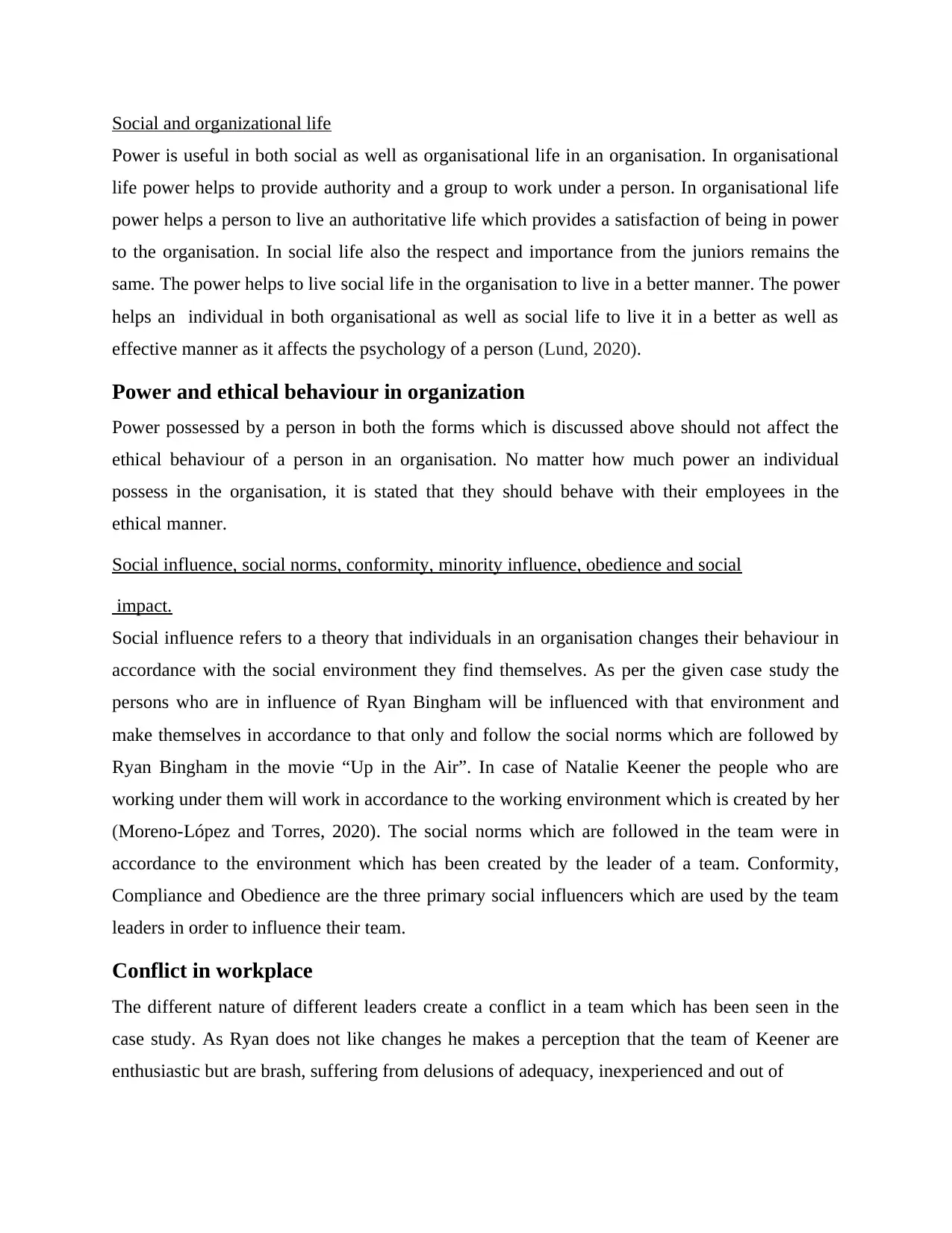
Social and organizational life
Power is useful in both social as well as organisational life in an organisation. In organisational
life power helps to provide authority and a group to work under a person. In organisational life
power helps a person to live an authoritative life which provides a satisfaction of being in power
to the organisation. In social life also the respect and importance from the juniors remains the
same. The power helps to live social life in the organisation to live in a better manner. The power
helps an individual in both organisational as well as social life to live it in a better as well as
effective manner as it affects the psychology of a person (Lund, 2020).
Power and ethical behaviour in organization
Power possessed by a person in both the forms which is discussed above should not affect the
ethical behaviour of a person in an organisation. No matter how much power an individual
possess in the organisation, it is stated that they should behave with their employees in the
ethical manner.
Social influence, social norms, conformity, minority influence, obedience and social
impact.
Social influence refers to a theory that individuals in an organisation changes their behaviour in
accordance with the social environment they find themselves. As per the given case study the
persons who are in influence of Ryan Bingham will be influenced with that environment and
make themselves in accordance to that only and follow the social norms which are followed by
Ryan Bingham in the movie “Up in the Air”. In case of Natalie Keener the people who are
working under them will work in accordance to the working environment which is created by her
(Moreno-López and Torres, 2020). The social norms which are followed in the team were in
accordance to the environment which has been created by the leader of a team. Conformity,
Compliance and Obedience are the three primary social influencers which are used by the team
leaders in order to influence their team.
Conflict in workplace
The different nature of different leaders create a conflict in a team which has been seen in the
case study. As Ryan does not like changes he makes a perception that the team of Keener are
enthusiastic but are brash, suffering from delusions of adequacy, inexperienced and out of
Power is useful in both social as well as organisational life in an organisation. In organisational
life power helps to provide authority and a group to work under a person. In organisational life
power helps a person to live an authoritative life which provides a satisfaction of being in power
to the organisation. In social life also the respect and importance from the juniors remains the
same. The power helps to live social life in the organisation to live in a better manner. The power
helps an individual in both organisational as well as social life to live it in a better as well as
effective manner as it affects the psychology of a person (Lund, 2020).
Power and ethical behaviour in organization
Power possessed by a person in both the forms which is discussed above should not affect the
ethical behaviour of a person in an organisation. No matter how much power an individual
possess in the organisation, it is stated that they should behave with their employees in the
ethical manner.
Social influence, social norms, conformity, minority influence, obedience and social
impact.
Social influence refers to a theory that individuals in an organisation changes their behaviour in
accordance with the social environment they find themselves. As per the given case study the
persons who are in influence of Ryan Bingham will be influenced with that environment and
make themselves in accordance to that only and follow the social norms which are followed by
Ryan Bingham in the movie “Up in the Air”. In case of Natalie Keener the people who are
working under them will work in accordance to the working environment which is created by her
(Moreno-López and Torres, 2020). The social norms which are followed in the team were in
accordance to the environment which has been created by the leader of a team. Conformity,
Compliance and Obedience are the three primary social influencers which are used by the team
leaders in order to influence their team.
Conflict in workplace
The different nature of different leaders create a conflict in a team which has been seen in the
case study. As Ryan does not like changes he makes a perception that the team of Keener are
enthusiastic but are brash, suffering from delusions of adequacy, inexperienced and out of
⊘ This is a preview!⊘
Do you want full access?
Subscribe today to unlock all pages.

Trusted by 1+ million students worldwide
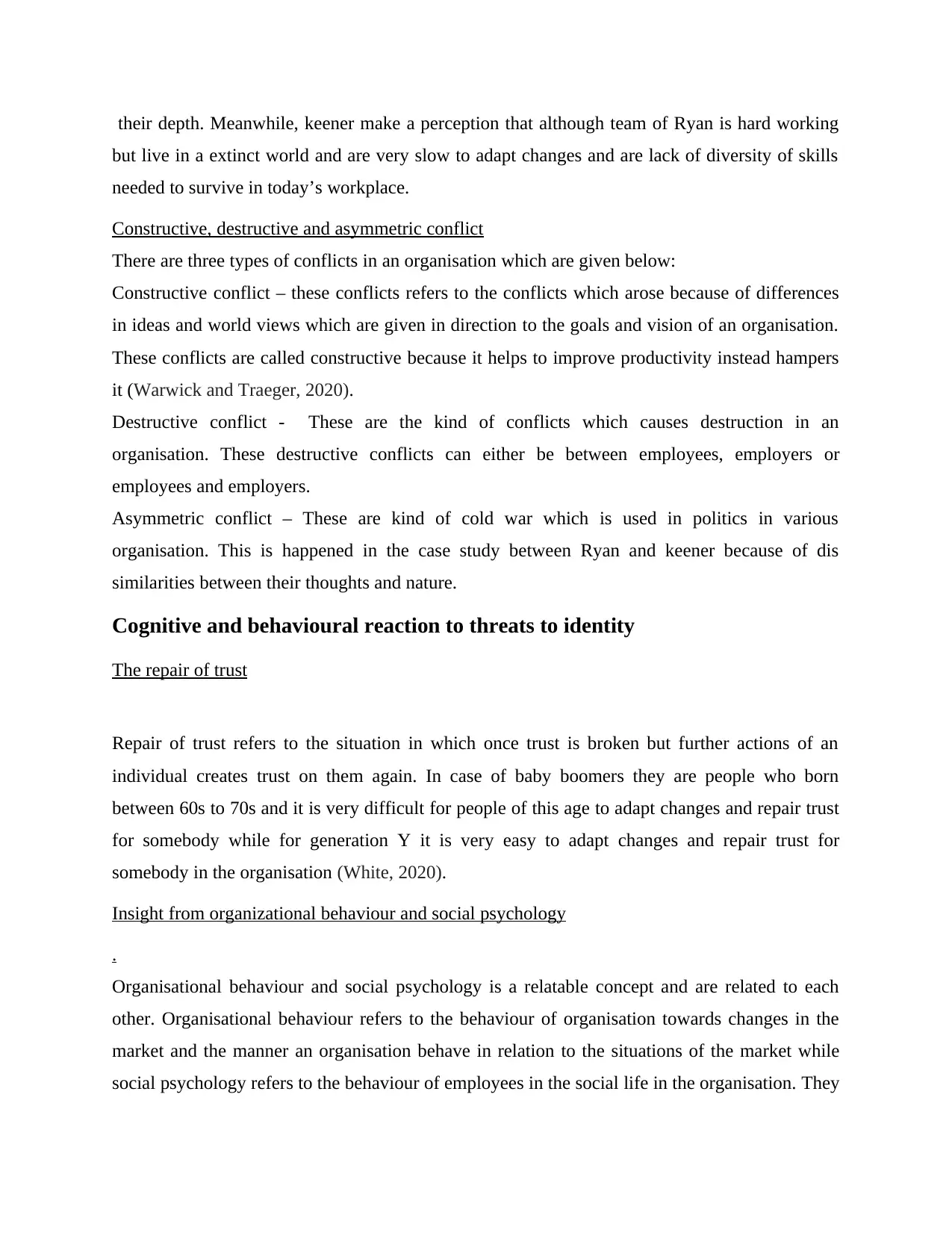
their depth. Meanwhile, keener make a perception that although team of Ryan is hard working
but live in a extinct world and are very slow to adapt changes and are lack of diversity of skills
needed to survive in today’s workplace.
Constructive, destructive and asymmetric conflict
There are three types of conflicts in an organisation which are given below:
Constructive conflict – these conflicts refers to the conflicts which arose because of differences
in ideas and world views which are given in direction to the goals and vision of an organisation.
These conflicts are called constructive because it helps to improve productivity instead hampers
it (Warwick and Traeger, 2020).
Destructive conflict - These are the kind of conflicts which causes destruction in an
organisation. These destructive conflicts can either be between employees, employers or
employees and employers.
Asymmetric conflict – These are kind of cold war which is used in politics in various
organisation. This is happened in the case study between Ryan and keener because of dis
similarities between their thoughts and nature.
Cognitive and behavioural reaction to threats to identity
The repair of trust
Repair of trust refers to the situation in which once trust is broken but further actions of an
individual creates trust on them again. In case of baby boomers they are people who born
between 60s to 70s and it is very difficult for people of this age to adapt changes and repair trust
for somebody while for generation Y it is very easy to adapt changes and repair trust for
somebody in the organisation (White, 2020).
Insight from organizational behaviour and social psychology
.
Organisational behaviour and social psychology is a relatable concept and are related to each
other. Organisational behaviour refers to the behaviour of organisation towards changes in the
market and the manner an organisation behave in relation to the situations of the market while
social psychology refers to the behaviour of employees in the social life in the organisation. They
but live in a extinct world and are very slow to adapt changes and are lack of diversity of skills
needed to survive in today’s workplace.
Constructive, destructive and asymmetric conflict
There are three types of conflicts in an organisation which are given below:
Constructive conflict – these conflicts refers to the conflicts which arose because of differences
in ideas and world views which are given in direction to the goals and vision of an organisation.
These conflicts are called constructive because it helps to improve productivity instead hampers
it (Warwick and Traeger, 2020).
Destructive conflict - These are the kind of conflicts which causes destruction in an
organisation. These destructive conflicts can either be between employees, employers or
employees and employers.
Asymmetric conflict – These are kind of cold war which is used in politics in various
organisation. This is happened in the case study between Ryan and keener because of dis
similarities between their thoughts and nature.
Cognitive and behavioural reaction to threats to identity
The repair of trust
Repair of trust refers to the situation in which once trust is broken but further actions of an
individual creates trust on them again. In case of baby boomers they are people who born
between 60s to 70s and it is very difficult for people of this age to adapt changes and repair trust
for somebody while for generation Y it is very easy to adapt changes and repair trust for
somebody in the organisation (White, 2020).
Insight from organizational behaviour and social psychology
.
Organisational behaviour and social psychology is a relatable concept and are related to each
other. Organisational behaviour refers to the behaviour of organisation towards changes in the
market and the manner an organisation behave in relation to the situations of the market while
social psychology refers to the behaviour of employees in the social life in the organisation. They
Paraphrase This Document
Need a fresh take? Get an instant paraphrase of this document with our AI Paraphraser
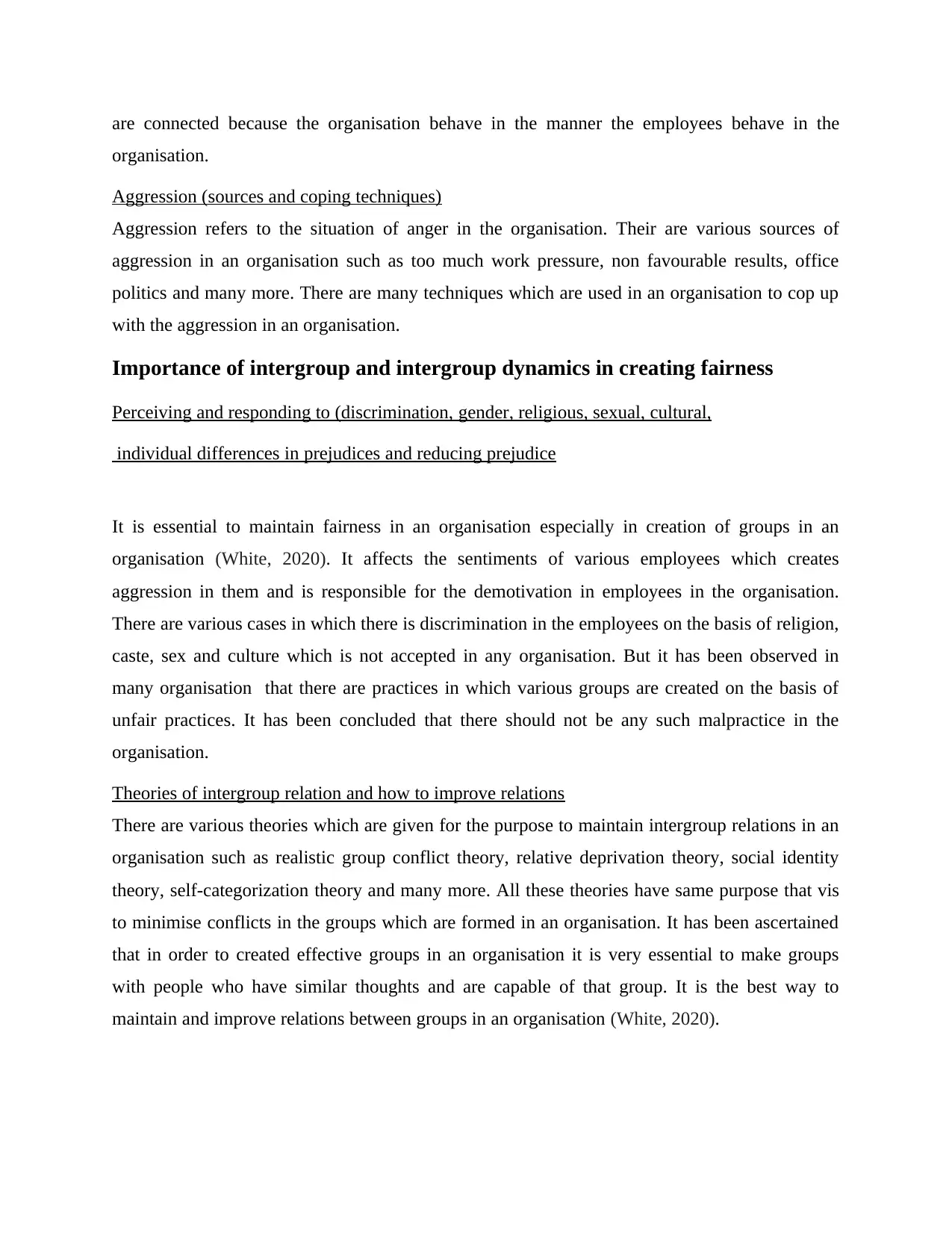
are connected because the organisation behave in the manner the employees behave in the
organisation.
Aggression (sources and coping techniques)
Aggression refers to the situation of anger in the organisation. Their are various sources of
aggression in an organisation such as too much work pressure, non favourable results, office
politics and many more. There are many techniques which are used in an organisation to cop up
with the aggression in an organisation.
Importance of intergroup and intergroup dynamics in creating fairness
Perceiving and responding to (discrimination, gender, religious, sexual, cultural,
individual differences in prejudices and reducing prejudice
It is essential to maintain fairness in an organisation especially in creation of groups in an
organisation (White, 2020). It affects the sentiments of various employees which creates
aggression in them and is responsible for the demotivation in employees in the organisation.
There are various cases in which there is discrimination in the employees on the basis of religion,
caste, sex and culture which is not accepted in any organisation. But it has been observed in
many organisation that there are practices in which various groups are created on the basis of
unfair practices. It has been concluded that there should not be any such malpractice in the
organisation.
Theories of intergroup relation and how to improve relations
There are various theories which are given for the purpose to maintain intergroup relations in an
organisation such as realistic group conflict theory, relative deprivation theory, social identity
theory, self-categorization theory and many more. All these theories have same purpose that vis
to minimise conflicts in the groups which are formed in an organisation. It has been ascertained
that in order to created effective groups in an organisation it is very essential to make groups
with people who have similar thoughts and are capable of that group. It is the best way to
maintain and improve relations between groups in an organisation (White, 2020).
organisation.
Aggression (sources and coping techniques)
Aggression refers to the situation of anger in the organisation. Their are various sources of
aggression in an organisation such as too much work pressure, non favourable results, office
politics and many more. There are many techniques which are used in an organisation to cop up
with the aggression in an organisation.
Importance of intergroup and intergroup dynamics in creating fairness
Perceiving and responding to (discrimination, gender, religious, sexual, cultural,
individual differences in prejudices and reducing prejudice
It is essential to maintain fairness in an organisation especially in creation of groups in an
organisation (White, 2020). It affects the sentiments of various employees which creates
aggression in them and is responsible for the demotivation in employees in the organisation.
There are various cases in which there is discrimination in the employees on the basis of religion,
caste, sex and culture which is not accepted in any organisation. But it has been observed in
many organisation that there are practices in which various groups are created on the basis of
unfair practices. It has been concluded that there should not be any such malpractice in the
organisation.
Theories of intergroup relation and how to improve relations
There are various theories which are given for the purpose to maintain intergroup relations in an
organisation such as realistic group conflict theory, relative deprivation theory, social identity
theory, self-categorization theory and many more. All these theories have same purpose that vis
to minimise conflicts in the groups which are formed in an organisation. It has been ascertained
that in order to created effective groups in an organisation it is very essential to make groups
with people who have similar thoughts and are capable of that group. It is the best way to
maintain and improve relations between groups in an organisation (White, 2020).
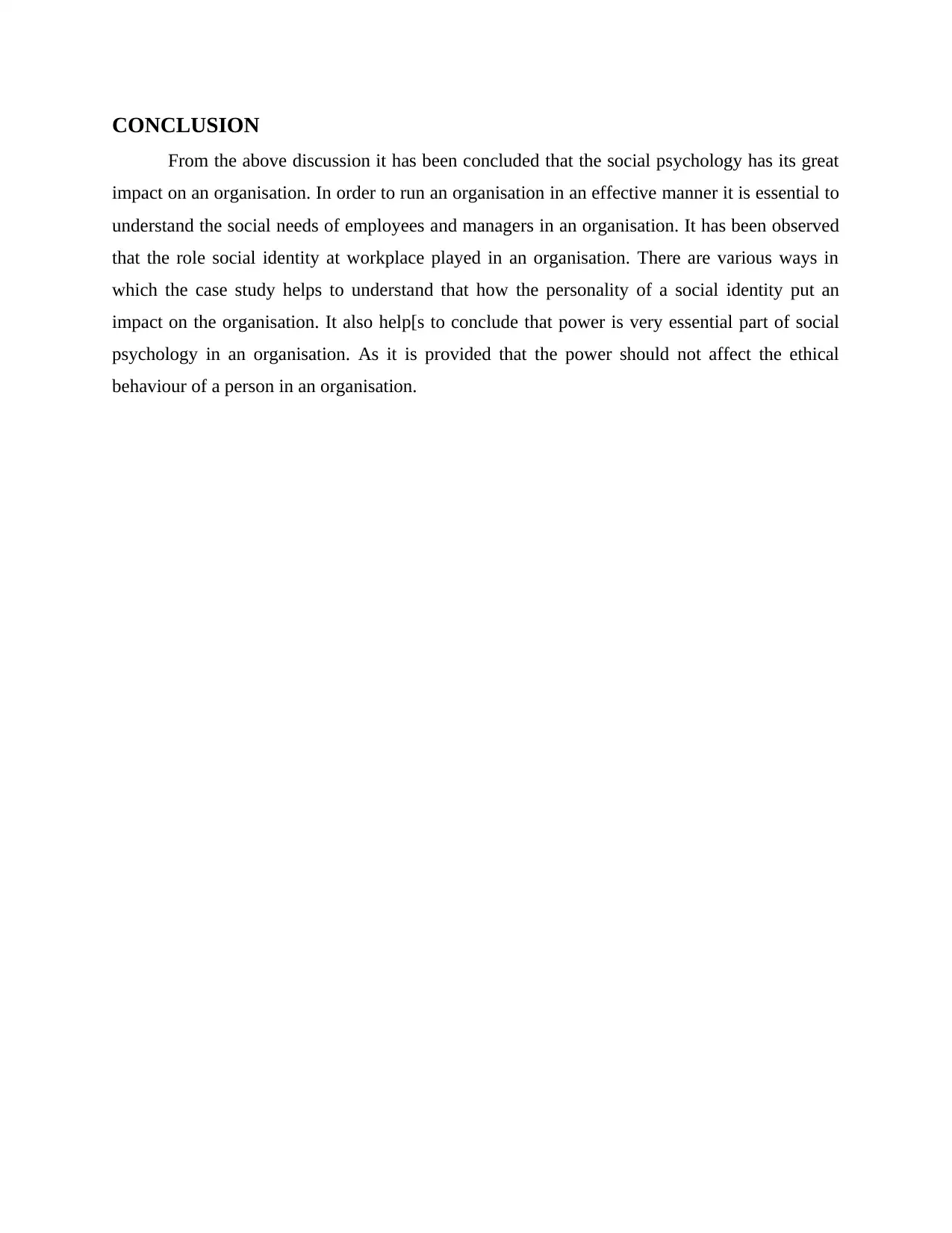
CONCLUSION
From the above discussion it has been concluded that the social psychology has its great
impact on an organisation. In order to run an organisation in an effective manner it is essential to
understand the social needs of employees and managers in an organisation. It has been observed
that the role social identity at workplace played in an organisation. There are various ways in
which the case study helps to understand that how the personality of a social identity put an
impact on the organisation. It also help[s to conclude that power is very essential part of social
psychology in an organisation. As it is provided that the power should not affect the ethical
behaviour of a person in an organisation.
From the above discussion it has been concluded that the social psychology has its great
impact on an organisation. In order to run an organisation in an effective manner it is essential to
understand the social needs of employees and managers in an organisation. It has been observed
that the role social identity at workplace played in an organisation. There are various ways in
which the case study helps to understand that how the personality of a social identity put an
impact on the organisation. It also help[s to conclude that power is very essential part of social
psychology in an organisation. As it is provided that the power should not affect the ethical
behaviour of a person in an organisation.
⊘ This is a preview!⊘
Do you want full access?
Subscribe today to unlock all pages.

Trusted by 1+ million students worldwide
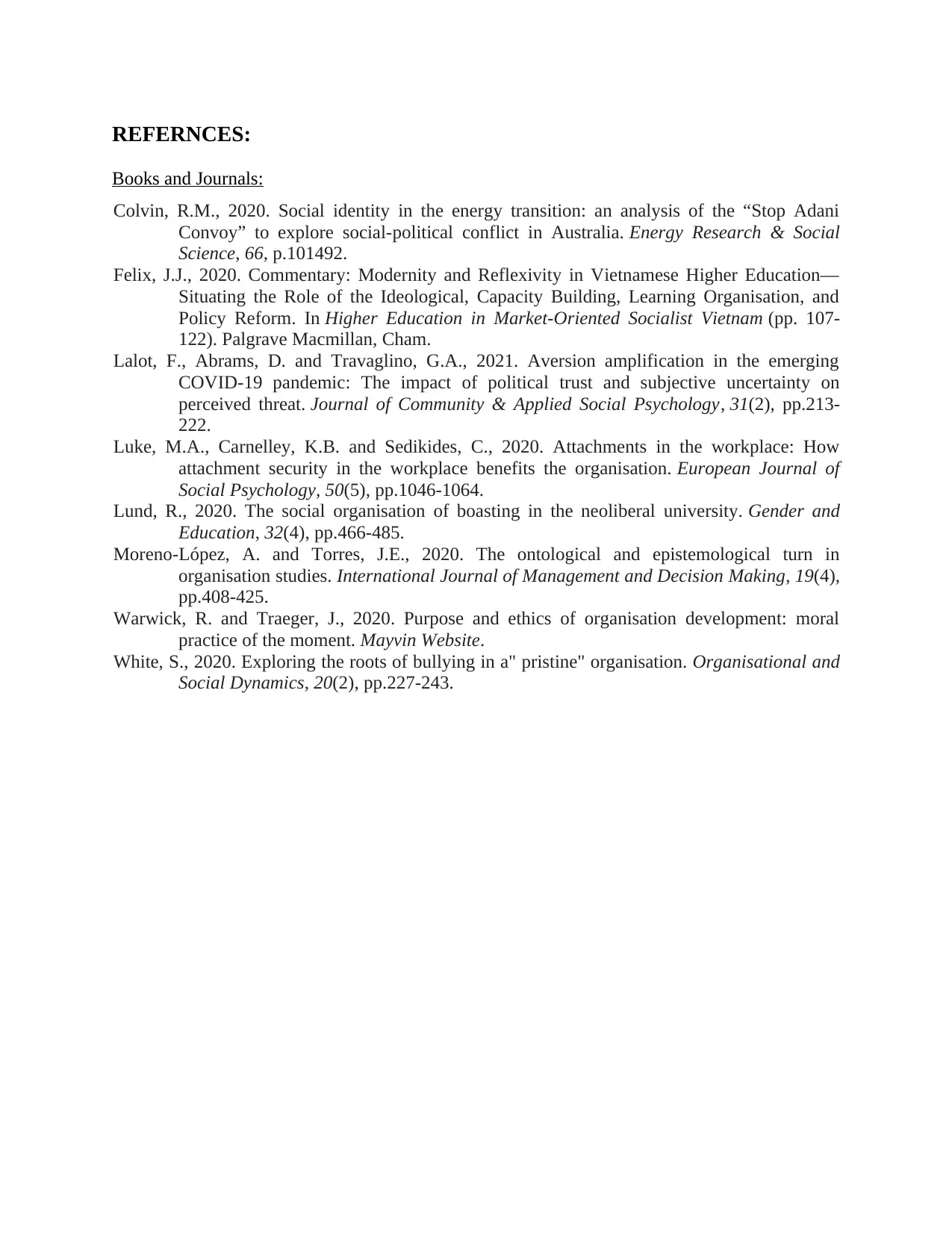
REFERNCES:
Books and Journals:
Colvin, R.M., 2020. Social identity in the energy transition: an analysis of the “Stop Adani
Convoy” to explore social-political conflict in Australia. Energy Research & Social
Science, 66, p.101492.
Felix, J.J., 2020. Commentary: Modernity and Reflexivity in Vietnamese Higher Education—
Situating the Role of the Ideological, Capacity Building, Learning Organisation, and
Policy Reform. In Higher Education in Market-Oriented Socialist Vietnam (pp. 107-
122). Palgrave Macmillan, Cham.
Lalot, F., Abrams, D. and Travaglino, G.A., 2021. Aversion amplification in the emerging
COVID‐19 pandemic: The impact of political trust and subjective uncertainty on
perceived threat. Journal of Community & Applied Social Psychology, 31(2), pp.213-
222.
Luke, M.A., Carnelley, K.B. and Sedikides, C., 2020. Attachments in the workplace: How
attachment security in the workplace benefits the organisation. European Journal of
Social Psychology, 50(5), pp.1046-1064.
Lund, R., 2020. The social organisation of boasting in the neoliberal university. Gender and
Education, 32(4), pp.466-485.
Moreno-López, A. and Torres, J.E., 2020. The ontological and epistemological turn in
organisation studies. International Journal of Management and Decision Making, 19(4),
pp.408-425.
Warwick, R. and Traeger, J., 2020. Purpose and ethics of organisation development: moral
practice of the moment. Mayvin Website.
White, S., 2020. Exploring the roots of bullying in a" pristine" organisation. Organisational and
Social Dynamics, 20(2), pp.227-243.
Books and Journals:
Colvin, R.M., 2020. Social identity in the energy transition: an analysis of the “Stop Adani
Convoy” to explore social-political conflict in Australia. Energy Research & Social
Science, 66, p.101492.
Felix, J.J., 2020. Commentary: Modernity and Reflexivity in Vietnamese Higher Education—
Situating the Role of the Ideological, Capacity Building, Learning Organisation, and
Policy Reform. In Higher Education in Market-Oriented Socialist Vietnam (pp. 107-
122). Palgrave Macmillan, Cham.
Lalot, F., Abrams, D. and Travaglino, G.A., 2021. Aversion amplification in the emerging
COVID‐19 pandemic: The impact of political trust and subjective uncertainty on
perceived threat. Journal of Community & Applied Social Psychology, 31(2), pp.213-
222.
Luke, M.A., Carnelley, K.B. and Sedikides, C., 2020. Attachments in the workplace: How
attachment security in the workplace benefits the organisation. European Journal of
Social Psychology, 50(5), pp.1046-1064.
Lund, R., 2020. The social organisation of boasting in the neoliberal university. Gender and
Education, 32(4), pp.466-485.
Moreno-López, A. and Torres, J.E., 2020. The ontological and epistemological turn in
organisation studies. International Journal of Management and Decision Making, 19(4),
pp.408-425.
Warwick, R. and Traeger, J., 2020. Purpose and ethics of organisation development: moral
practice of the moment. Mayvin Website.
White, S., 2020. Exploring the roots of bullying in a" pristine" organisation. Organisational and
Social Dynamics, 20(2), pp.227-243.
1 out of 10
Related Documents
Your All-in-One AI-Powered Toolkit for Academic Success.
+13062052269
info@desklib.com
Available 24*7 on WhatsApp / Email
![[object Object]](/_next/static/media/star-bottom.7253800d.svg)
Unlock your academic potential
Copyright © 2020–2025 A2Z Services. All Rights Reserved. Developed and managed by ZUCOL.





